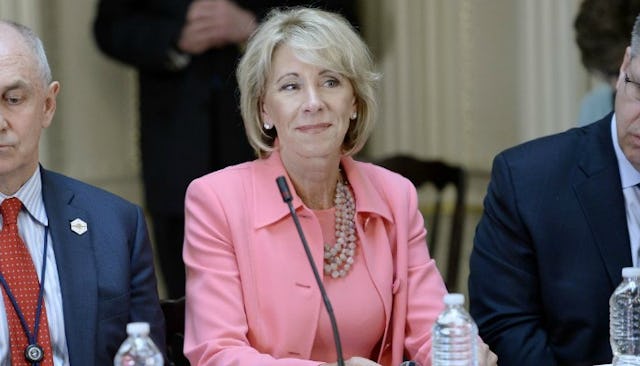In Case You Missed It, Here’s What Betsy DeVos Has Been Up To Lately

There’s not much about Betsy DeVos, since she was nominated for secretary of education, that hasn’t created controversy. She is a wealthy Republican donor and school choice advocate with no teaching or public school experience with a brother who founded the controversial private security company Blackwater.
She became a national punch line during her confirmation hearings both because of her poor performance as well as for implying that guns could be useful to protect schoolchildren from grizzly bears.
DeVos has called education reform efforts “a way to advance God’s kingdom.”
She’s said that picking a school should be just like deciding between ride-sharing apps like Uber and Lyft.
She’s called historically black colleges and universities “real pioneers when it comes to school choice.” (They were founded during the height of racial segregation, when students of color weren’t allowed in whites-only colleges.)
But these previous statements have been just words — not actions. Even her harshest skeptic couldn’t know exactly what she would do as an education secretary.
Now we’re beginning to get clear signs of how our nation’s schools will be governed under DeVos based on her actual policies. And the signs are proving ominous.
She’s making it harder for Americans to pay back their student loan debt.
DeVos has initiated a series of measures that will make repayment more difficult for borrowers. DeVos has chosen to toss out protections for student loan borrowers enacted during the Obama administration. These protections included helping borrowers stay away from student loan companies with bad track records and poor service. Last month, she reversed an Obama-era protection that would prevent lenders from charging collection fees to borrowers who are attempting to get out of default.
The Obama administration also wanted to create a centralized system for student loan repayment to replace the confusing system in place now, in which a single student might have to negotiate with many different companies for requesting deferments, for setting up payment schedules, and other transactions. DeVos has scrapped those plans.
Her deep cuts to the education budget will hurt low-income students and many others.
The new “America First” budget aims for a 13% reduction in education spending, totaling about $9 billion.
About $1.2 billion of those cuts will be to summer and after school programs for at-risk children. Among the list of programs to be axed by Trump and DeVos are 21st Century Community Learning Centers, a national after-school program that helps school districts, churches, and nonprofits and serves 1.6 million children across the country. Programs begun by President Obama to give money to local school-integration efforts are also likely to be discontinued.
The new administration is cutting one of President Obama’s signature grant programs, Opening Doors, Expanding Opportunities, which supports local communities’ efforts at improving diversity and achievement in low-performing schools. Billions will also be cut from programs that serve to help millions of first-generation college students get into and pay for college, as well as from teaching training programs.
Which parts of the education budget will benefit? About $1.4 billion will be shifted to voucher and school choice programs.
Former education secretary under President Obama has called DeVos’s new budget priorities “an assault on the American Dream that will disproportionately harm the poor and children of color.”
Meanwhile, her own unusual security arrangement — she receives protection from U.S. marshals — costs the Education Department (and taxpayers) about $1 million per month. The last time a cabinet member has been guarded by federal marshals was 2009. They have never provided security for a secretary of education.
Her new choice to head the civil rights division seems to oppose the mission of the department that she will lead.
There are equally troubling signs for civil rights under the new administration. Candice Jackson has been appointed by DeVos to be the new acting head to run the Office of Civil Rights, which investigates thousands of claims of discrimination every year by women and minorities. Jackson once spoke out about the discrimination that she herself claimed to face as a white college student. She opposes affirmative action, or “giving special assistance to minority students.”
Jackson is best known for opposing Hillary Clinton and for writing a book called Their Lives: The Women Targeted by the Clinton Machine. She and Trump supporters such as Steve Bannon and Roger Stone brought the women who accused Bill Clinton of sexual improprieties to one of the presidential debates last year. (Meanwhile, Jackson called the women who accused Trump of sexual misconduct “fake victims.”)
Jackson also opposes feminism, once writing, “In today’s society, women have the same opportunities as men to advance their careers, raise families, and pursue their personal goals. College women who insist on banding together by gender to fight for their rights are moving backwards, not forwards.”
Most alarmingly, DeVos has declined so far to commit to enforcing Title IX, particularly in relation to responding to sexual assault cases on college campuses. Her refusal to affirm that she’ll uphold that law sparked strong words from former Vice President Joe Biden.
In an interview with Teen Vogue, Biden said, “It bothers me most if Secretary DeVos is going to really dumb down Title IX enforcement. The real message, the real frightening message you’re going to send out is, our culture says it’s OK. You know, the major reason why women drop out of college when they’re a freshman is because of sexual assault. Not their grades, sexual assault. And so, it would be devastating.”
Because of the head-spinning daily chaos and turmoil in the Trump administration that make the headlines, it’s easy to lose sight of the changes Betsy DeVos has already proposed to our country’s educational system. Betsy DeVos has a vision for our children’s schools and universities, and it’s not one in the best interests of our society’s most vulnerable.
This article was originally published on